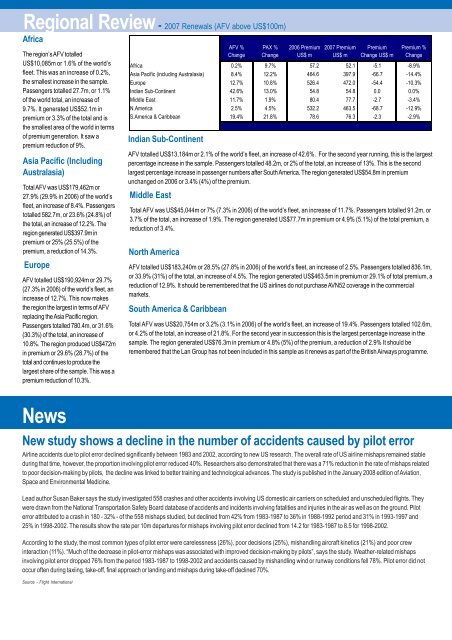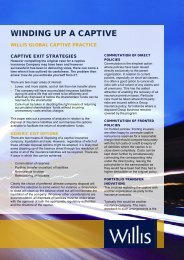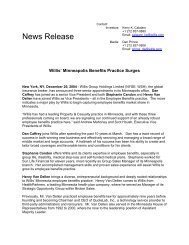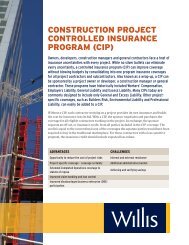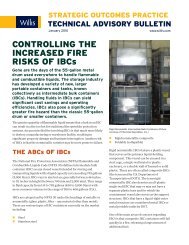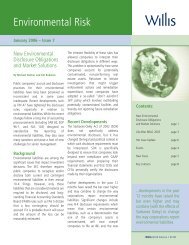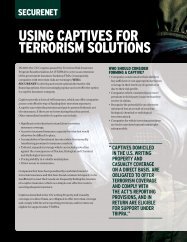willis ∙ iata ∙ aapa asia pacific aviation insurance conference
willis ∙ iata ∙ aapa asia pacific aviation insurance conference
willis ∙ iata ∙ aapa asia pacific aviation insurance conference
You also want an ePaper? Increase the reach of your titles
YUMPU automatically turns print PDFs into web optimized ePapers that Google loves.
Regional Review - 2007 Renewals (AFV above US$100m)<br />
Africa<br />
The region’s AFV totalled<br />
US$10,085m or 1.6% of the world’s<br />
fleet. This was an increase of 0.2%,<br />
the smallest increase in the sample.<br />
Passengers totalled 27.7m, or 1.1%<br />
of the world total, an increase of<br />
9.7%. It generated US$52.1m in<br />
premium or 3.3% of the total and is<br />
the smallest area of the world in terms<br />
of premium generation. It saw a<br />
premium reduction of 9%.<br />
Asia Pacific (Including<br />
Austral<strong>asia</strong>)<br />
Total AFV was US$179,462m or<br />
27.9% (29.9% in 2006) of the world’s<br />
fleet, an increase of 8.4%. Passengers<br />
totalled 582.7m, or 23.6% (24.8%) of<br />
the total, an increase of 12.2%. The<br />
region generated US$397.9m in<br />
premium or 25% (25.5%) of the<br />
premium, a reduction of 14.3%.<br />
Europe<br />
AFV totalled US$190,924m or 29.7%<br />
(27.3% in 2006) of the world’s fleet, an<br />
increase of 12.7%. This now makes<br />
the region the largest in terms of AFV<br />
replacing the Asia Pacific region.<br />
Passengers totalled 780.4m, or 31.6%<br />
(30.3%) of the total, an increase of<br />
10.8%. The region produced US$472m<br />
in premium or 29.6% (28.7%) of the<br />
total and continues to produce the<br />
largest share of the sample. This was a<br />
premium reduction of 10.3%.<br />
News<br />
New study shows a decline in the number of accidents caused by pilot error<br />
Airline accidents due to pilot error declined significantly between 1983 and 2002, according to new US research. The overall rate of US airline mishaps remained stable<br />
during that time, however, the proportion involving pilot error reduced 40%. Researchers also demonstrated that there was a 71% reduction in the rate of mishaps related<br />
to poor decision-making by pilots, the decline was linked to better training and technological advances. The study is published in the January 2008 edition of Aviation,<br />
Space and Environmental Medicine.<br />
Lead author Susan Baker says the study investigated 558 crashes and other accidents involving US domestic air carriers on scheduled and unscheduled flights. They<br />
were drawn from the National Transportation Safety Board database of accidents and incidents involving fatalities and injuries in the air as well as on the ground. Pilot<br />
error attributed to a crash in 180 - 32% - of the 558 mishaps studied, but declined from 42% from 1983-1987 to 36% in 1988-1992 period and 31% in 1993-1997 and<br />
25% in 1998-2002. The results show the rate per 10m departures for mishaps involving pilot error declined from 14.2 for 1983-1987 to 8.5 for 1998-2002.<br />
According to the study, the most common types of pilot error were carelessness (26%), poor decisions (25%), mishandling aircraft kinetics (21%) and poor crew<br />
interaction (11%). “Much of the decrease in pilot-error mishaps was associated with improved decision-making by pilots”, says the study. Weather-related mishaps<br />
involving pilot error dropped 76% from the period 1983-1987 to 1998-2002 and accidents caused by mishandling wind or runway conditions fell 78%. Pilot error did not<br />
occur often during taxiing, take-off, final approach or landing and mishaps during take-off declined 70%.<br />
Source - Flight International<br />
Indian Sub-Continent<br />
AFV %<br />
Change<br />
PAX %<br />
Change<br />
2006 Premium<br />
US$ m<br />
Africa 0.2% 9.7% 57.2<br />
Asia Pacific (including Austral<strong>asia</strong>) 8.4% 12.2% 464.6<br />
Europe 12.7% 10.8% 526.4<br />
Indian Sub-Continent 42.6% 13.0% 54.8<br />
Middle East 11.7% 1.9% 80.4<br />
N.America 2.5% 4.5% 532.2<br />
S.America & Caribbean 19.4% 21.8% 78.6<br />
2007 Premium<br />
US$ m<br />
Premium<br />
Change US$ m<br />
Premium %<br />
Change<br />
AFV totalled US$13,184m or 2.1% of the world’s fleet, an increase of 42.6%. For the second year running, this is the largest<br />
percentage increase in the sample. Passengers totalled 48.2m, or 2% of the total, an increase of 13%. This is the second<br />
largest percentage increase in passenger numbers after South America. The region generated US$54.8m in premium<br />
unchanged on 2006 or 3.4% (4%) of the premium.<br />
Middle East<br />
52.1<br />
397.9<br />
472.0<br />
54.8<br />
77.7<br />
463.5<br />
76.3<br />
-5.1 -8.9%<br />
-66.7 -14.4%<br />
-54.4 -10.3%<br />
0.0 0.0%<br />
-2.7 -3.4%<br />
-68.7 -12.9%<br />
-2.3 -2.9%<br />
Total AFV was US$45,044m or 7% (7.3% in 2006) of the world’s fleet, an increase of 11.7%. Passengers totalled 91.2m, or<br />
3.7% of the total, an increase of 1.9%. The region generated US$77.7m in premium or 4.9% (5.1%) of the total premium, a<br />
reduction of 3.4%.<br />
North America<br />
AFV totalled US$183,240m or 28.5% (27.8% in 2006) of the world’s fleet, an increase of 2.5%. Passengers totalled 836.1m,<br />
or 33.9% (31%) of the total, an increase of 4.5%. The region generated US$463.5m in premium or 29.1% of total premium, a<br />
reduction of 12.9%. It should be remembered that the US airlines do not purchase AVN52 coverage in the commercial<br />
markets.<br />
South America & Caribbean<br />
Total AFV was US$20,754m or 3.2% (3.1% in 2006) of the world’s fleet, an increase of 19.4%. Passengers totalled 102.6m,<br />
or 4.2% of the total, an increase of 21.8%. For the second year in succession this is the largest percentage increase in the<br />
sample. The region generated US$76.3m in premium or 4.8% (5%) of the premium, a reduction of 2.9% It should be<br />
remembered that the Lan Group has not been included in this sample as it renews as part of the British Airways programme.


